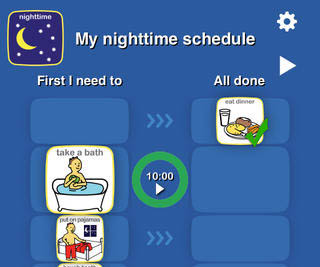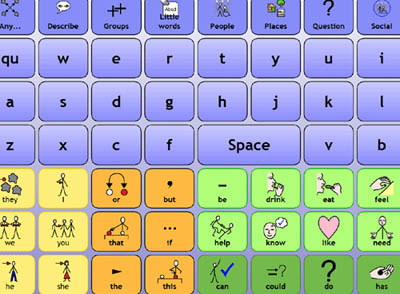 Newsletter: join thousands of other people
Newsletter: join thousands of other people
Once a month we'll send you an email with news, research and thoughts, as well as training courses and free webinars you may wish to attend.
Posted by Paul Nisbet on the 19th May, 2016

For Digital Learning Week, we're looking at some examples of Assistive and Communication Technology and today I'm going to offer some reflections on voice output communication aids. In particular, we'll consider some pros and cons of using an iPad for communication, versus a Windows tablet.
Voice output aids have been around for decades - one of the earliest was created in the mid 1980's by David Mason, for Professor Stephen Hawking. By 2000 voice output aids were available commercially from a whole range of manufacturers. They were, compared to ordinary computers, relatively expensive, reflecting the costs of developing bespoke electronics, hardware and software, and a relatively small market.
Then in 2010 the iPad was launched. It was and is, a small, light, easy to use device, but it was the 'app' ecosystem that really changed the software and computer game: instead of going along to PC World and paying quite a lot of money for a box with a CD, which you then installed on your computer, you paid 69p and got the software on your iPad immediately. Paying no or very little money for software can have it's disadvantages, in that you may get no or very little support to help you make it work, but there's no doubt that the iPad has had a huge impact on how we obtain and use personal technology, and this has also impacted on voice output communication technology. But we now have Android and Windows tablets as well, so where does that leave the iPad?
This morning I had a conversation with a teacher in a special school. Two pupils are going to be starting next term; one has an iPad, and the other has a Windows tablet, which they both use for personal communication. There are other learners in the school who would benefit from this type of technology, and so we discussed the relative merits of each. The local authority ICT team does not provide technical support for iPads, and they cannot be connected to the school wifi: why then, would the school invest in iPads rather than Windows tablets?

Well it depends on what you want to do. The pupil with the iPad has:
Would you buy a Windows tablet for this learner or for other learners with similar needs in the school? No. The apps this learner uses are just not available for Windows. You could use some Windows programs to create something similar - for example, you could buy The Grid 3 (£480) for personal communication, and make some visual schedules using, say, BoardMaker Studio (£249), and get Book Creator (free) for stories. You could use The Grid to create visual schedules as well, but it's just not the same as what you can do with ChoiceWorks. You'll also note that these Windows programs are a lot more expensive. And the plain fact is that they are simply far more apps available for learners with additional support needs on iPad than on Windows.
So when your colleagues in technical support suggest that you just buy Windows tablets because after all, they're all the same, ask them to go away and first find you apps that provide the functions and features that you and your learners need (which may or may not involve running Microsoft Office).
A couple of weeks ago we loaned a Windows tablet to a young man, for evaluation. He had an older VOCA which he did not use very much, and the main reasons given were that a) he didn't like the voice and b) he felt the device looked clunky and old fashioned. You may argue that these aren't good enough reasons for rejecting a communication aid, and that we should be persuading this 10 year old in a mainstream school to persevere.
Or, we could lend him a slightly shinier device with Stuart, the Scottish computer voice, and find out if the voice and physical design do in fact impact on his communication.
So he was really quite excited to get his hands on a Windows 11" tablet, running The Grid 3 software, with a Scottish accent. Time and the trial will tell whether it makes the difference in terms of his communication, though. 
So, why go for the Windows tablet instead of an iPad? Primarily because it speaks Scottish. (That's a hint for iOS app developers - go and speak to CereProc about licencing their voices for your apps - and they don't just do Scottish, they also do lots of other accents and languages (Irish, Scottish Gaelic, northern and southern English, West Midlands, Dutch, German, Brazilian Portuguese, Japanese)).
Other reasons for considering a Windows tablet are:
It depends on what you want to do. It's like asking which bicycle is best - if you want to go down the mountain, get a mountain bike, but if you want to do the Bealach Mor road route, you're much better off with a road bike. (Believe me, I know.)
To make a decision about technology for personal communication or for accessing the curriculum, you need to know what you're trying to achieve, you need to know what is available, and then you can compare them both and come to a decision based on this knowledge. We're here to help!

10-week short study online course

Once a month we'll send you an email with news, research and thoughts, as well as training courses and free webinars you may wish to attend.
Our social media sites - YouTube, Twitter and Facebook